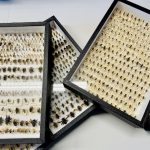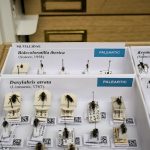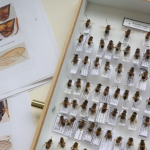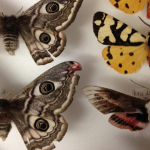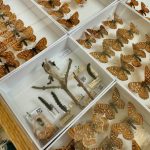Launched in January 2024, ARCADE is one of 12 projects funded by TETTRIs, all aimed at co-creating solutions that drive transformative change in taxonomy. With over €130,000 in funding, this satellite project focuses on enhancing, revising, and indexing Portuguese pollinator reference collections. By doing so, ARCADE seeks to transform public understanding of these vital species and boost conservation efforts.
The initiative aims to develop an easy-to-use and up-to-date database for key pollinator species in Portugal, enhance five public national reference collections, and establish new methods for organising and preserving existing and future collections.
The hidden biodiversity of the Mediterranean and Macaronesia Basins
The Iberian Peninsula is a biodiversity hotspot and one of the most species-rich areas in the Mediterranean Basin. This region hosts over 1,000 wild bee species, including more than 740 in Portugal, due to its warm, dry climate, abundance of open seasonal habitats, role as a historical refuge during past climatic shifts, and diverse flowering plants!
The Azorean and Madeiran archipelagos, situated in the Macaronesia biogeographic region, are part of the Mediterranean Basin biodiversity hotspot. Macaronesia features high levels of endemism due to its unique location, geological origins, and climate. Additionally, Portugal contains over 100 terrestrial Natura 2000 sites of significant ecological importance.
However, despite this biodiversity richness and the presence of essential (often threatened) pollinators, high-quality reference collections and accurate data on species data remain scarce. This lack of accurate and accessible knowledge, data and monitoring tools creates challenges for research and conservation efforts, putting these vital species at risk. This is where ARCADE steps in.
About ARCADE
ARCADE’s main goal is to improve the national reference collections of the main Portuguese pollinator groups: bees, hoverflies and butterflies, by:
- Creating an easy-to-use and up-to-date database integrating at least 7 existing (sub)collections of the key pollinator groups in Portugal.
- Enhancing 3 public reference collections in Lisbon, Porto and Coimbra, improving taxonomic accuracy, spatio-temporal coverage, and species diversity.
- Establishing new standards and best practices for organising and preserving current and future collections.
With this, the project aims to increase the public knowledge of pollinator’s taxonomy and distribution at the national level and provide access to standardised good-quality reference collections across the country. Ultimately, this will lay a solid foundation for implementing upcoming initiatives on taxonomy, conservation, and monitoring of pollinators in Portugal.
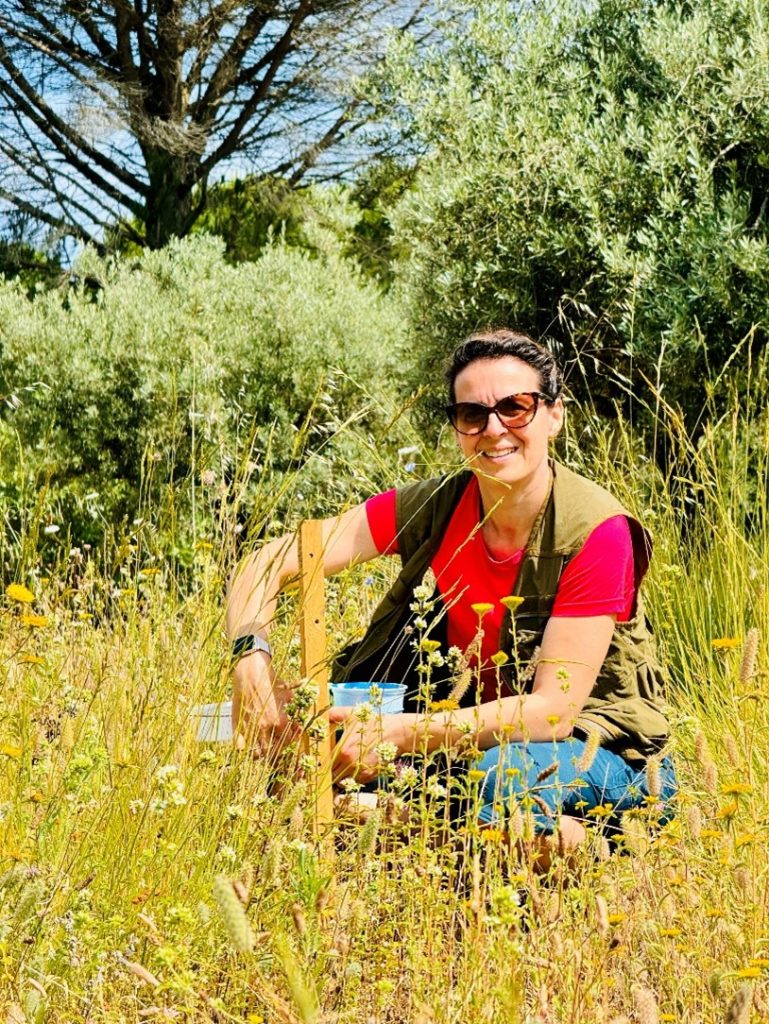
“It is an honour to lead such a wonderful team that is eager to work together to know and report on the existing specimens of the main groups of pollinators in scientific collections in Portugal, making all the information available to the scientific community, improving the reference collections, while valuing biological collections as key tools to support taxonomic capacity building”, shares Sílvia Castro, the coordinator of the ARCADE project and an expert on pollination ecology.
The ARCADE’s team
The ARCADE project involves six key institutions in Portugal, representing the country’s most significant reference collections, including the Universities of Lisbon, Porto, Coimbra, Madeira, and the Azores. Collectively, the team possesses substantial expertise in collection curation, insect pollinator taxonomy, and insect sampling.
- University of Coimbra (UC): Coordinating the project, the UC contributes through the FLOWer lab of the Centre for Functional Ecology, which specialises in pollination ecology and holds significant pollinator collections. It also includes the Science Museum of the University of Coimbra, which houses the largest collection of bees in Portugal.
- Tagis – Butterfly Conservation Centre of Portugal: This non-governmental organisation focuses on insect conservation and holds one of the largest pollinator collections in Portugal. It provides expertise in butterflies, hoverflies, and bees, along with field sampling and data curation.
- National Museum of Natural History and Science (MNHNC): As a reference natural history museum, MNHNC has significantly expanded its collections to include important specimens of bees, hoverflies, and butterflies. This organisation will play a vital role in taxonomic and collection management.
- Natural History and Science Museum of the University of Porto (MHNC-UP): This museum specialises in pollinator specimens, mainly from northern Portugal, contributing with valuable data and curation for all three pollinator groups.
- University of the Azores (UAc): The University of the Azores contributes through the Azorean Biodiversity Group of the Centre for Ecology, Evolution and Environmental Changes that holds important pollinator collections from the Azores and offers its expertise in biodiversity monitoring, entomology, data curation and collection management.
- University of Madeira (UMa): Situated on Madeira Island, the UMa contributes through its Insect’s Collection, which harbours significant pollinator collections and expertise in entomology, contributing to the overall goals.
Hugo Gaspar, a PhD student at the FLOWer Lab of the University of Coimbra, is actively involved in the ARCADE project, where he focuses on collection indexing, taxonomic revision, and species sampling of Portuguese bees. He shares, “The ARCADE project aligns perfectly with my PhD goals and tasks, allowing me to benefit from the collaborations it fosters while contributing new data and specimens not only to my host institution but also to the entomological collections of the Universities of Porto and Lisbon.” He adds, “I am very excited to be part of a project that will undoubtedly enhance the taxonomic capacity of my country!”
What have been the main achievements so far?
During its initial phase, ARCADE focused on gathering all available information from the main pollinator collections in Portugal. This phase involves indexing and reviewing at least seven subcollections of bees, hoverflies, and butterflies. So far, the team has been busy identifying collections and sub-collections in partner institutions, indexing them down to the specimen level, and starting the taxonomic revision and updates.
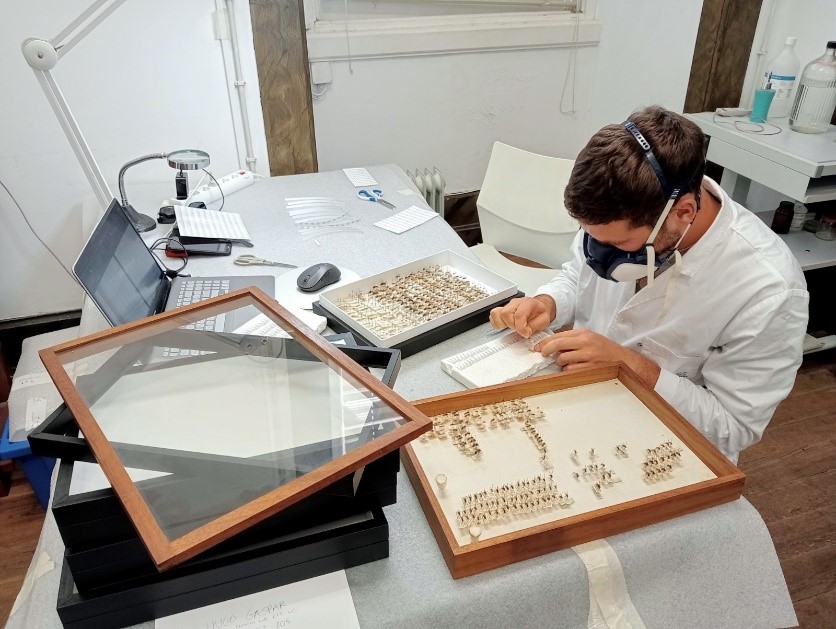
However, the ARCADE project has already yielded some exciting preliminary results! First and foremost, the taxonomic revision of bee collections, particularly at the Science Museum of the University of Coimbra, has led to the discovery of several new species that had not been previously recorded in Portugal. The team is currently working on a publication to share these findings with the scientific community and the public.
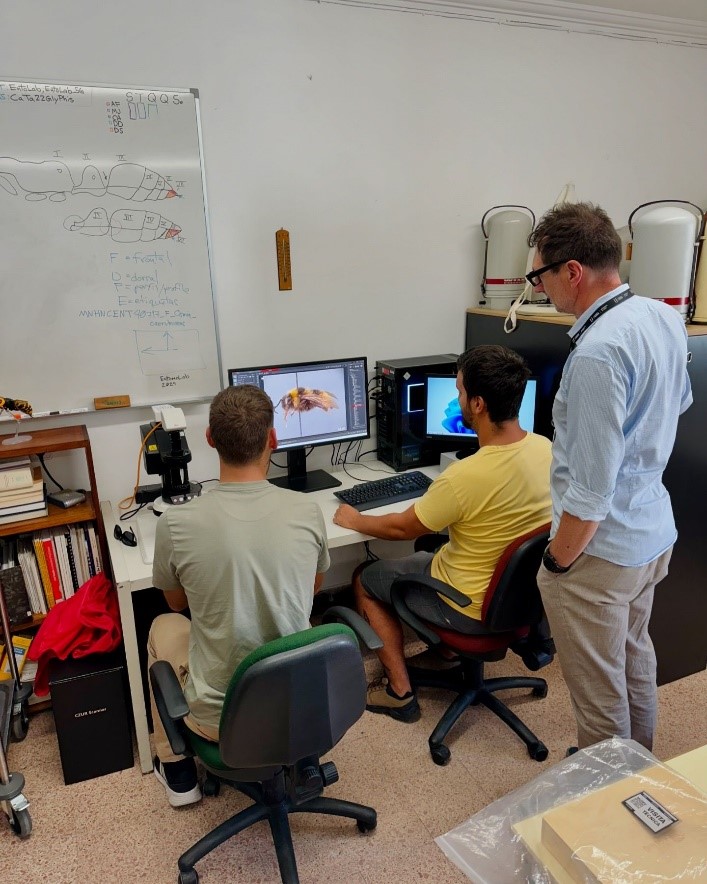
Additionally, the indexing of bee specimens has shown that the main collections at the Natural History Museums of Porto, Coimbra, and Lisbon provide a solid representation of bee species in Portugal. However, there are still some important gaps. Notably, while these collections include a variety of bee species, the representation of male and female specimens is uneven, and there are still many species that haven’t been documented at all. This highlights the need for further sampling efforts to capture a more complete picture of the country’s bee diversity.
What’s next for ARCADE?
In the coming months, the ARCADE team will finish indexing species and identify collection gaps. They’ll address these gaps in the project’s second year by collecting new samples or exchanging specimens with other institutions.
The team will also create a simple workflow that will allow other institutions and private collections to index their own collections, making information about Portugal’s pollinators more accessible and ready-to-use.
“We want to state how grateful we are for this opportunity to bring together such an excellent team working on the common goal of improving the scientific collections of bees, hoverflies and butterflies in Portugal! By identifying and filling in the missing pieces in each collection, we can build high-quality reference collections that will support pollinator monitoring efforts and help implement the Nature Restoration Law, along with a new pollinator monitoring program required for all EU member states!”
Stay connected
Follow ARCADE’s work at:
https://www.pollinet.pt/arcade (PT)
https://www.instagram.com/cfe_flowerlab/
https://www.facebook.com/cfeFLOWerLab

